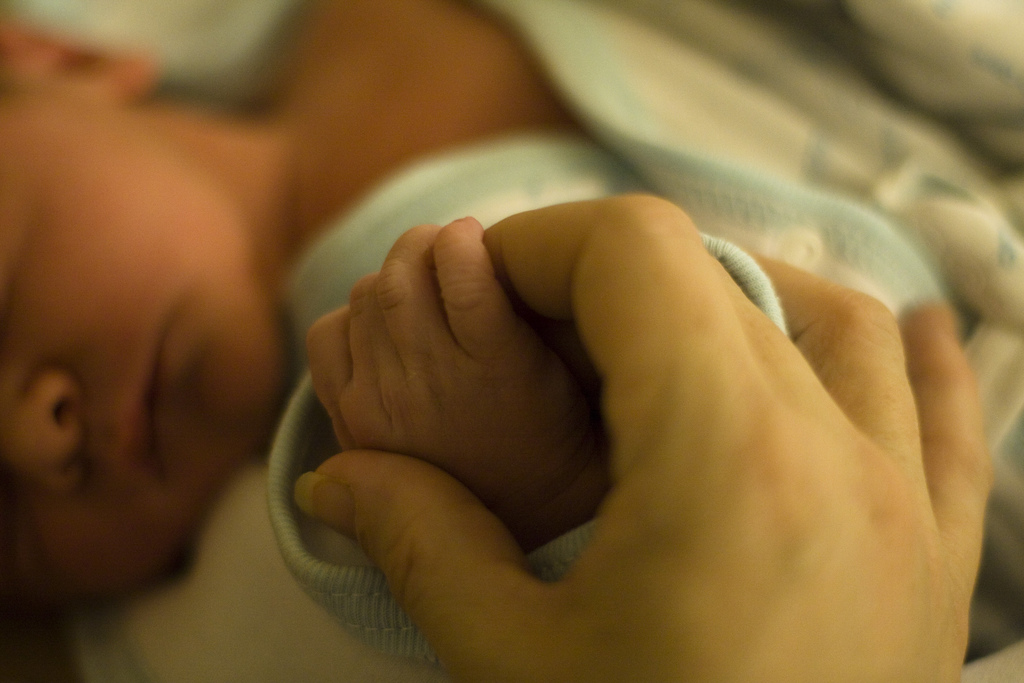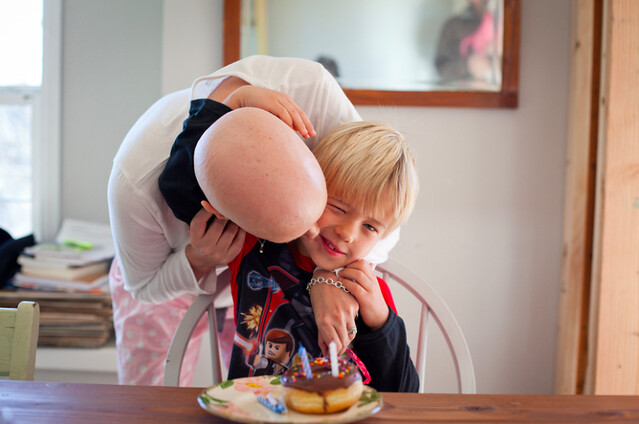“Put me as a seal upon thy heart, as a seal upon thy arm, for love is strong as death, jealousy as hard as hell, the lamps thereof are fire and flames. Many waters cannot quench charity, neither can the floods drown it: if a man should give all the substance of his house for love, he shall despise it as nothing.”
– Canticle of Canticles 8:6-7
This week in the news we witness two different and widely shared stories about death and dying. In the first example, Brittany Maynard, a 29-year-old newlywed, has a type of operable but particularly aggressive brain tumor. With the support of her husband and family and the approbation of voters and courts in the state of Oregon, she has chosen to cease medical treatment and intends to end her life on November 1, 2014. (Yes, the solemnity of All Saints, because even demons know the liturgical calendar well enough to wring from it the maximum, mocking irony.)
The second example is a study in contrasts. It comes from a different stage of life. Dan and Jenna Haley are a young Catholic husband and wife in Pennsylvania who were greeted with the good news that they were expecting a child. Prenatal testing showed their baby son had anencephaly (absence of most of the brain), which always indicates that a baby with this condition will die shortly after birth. Undeterred by such a heartbreaking diagnosis for their first child, they immediately named him Shane and put together an extensive list of about 30 things they wanted to do with their newborn son to celebrate his short but beautiful life before it reached its inevitable and far-too-early conclusion. By September 6th, they completed everything on the list, including visits to the shrines of St. Rita and St. John Neumann in Philadelphia.
Both stories have already generated passionate Facebook and commbox debate. How are we to face a terminal medical diagnosis? We certainly do not desire suffering or pain for our loved ones, and we are shocked that they will be taken from us far too soon. The fallen human will’s first instinct is selfishness, fear, control, and ultimately sin. Why choose to prolong the inevitable? This instinct explains how the majority of voters in a state like Oregon may decide that doctors can assist in the taking of a life in the name of deceitful mercy and fraudulent dignity. This decline of civilization also explains the rise of “suicide tourism” to Switzerland, a dark sort of one-way vacation. It also explains why Maynard explains her hard case wrapped in tones of quality-of-life and dignity:
Who has the right to tell me that I don’t deserve this choice? That I deserve to suffer for weeks or months in tremendous amounts of physical and emotional pain? Why should anyone have the right to make that choice for me?
She explains that she already has a dose of prescription medication that she intends to use to end her life.
I’ve had the medication for weeks. I am not suicidal. If I were, I would have consumed that medication long ago. I do not want to die. But I am dying. And I want to die on my own terms.
This desire to die on her “own terms” is somehow not suicidal? How? Because she has a right to not suffer? And as she says, who am I to tell this woman that she should embrace her cross and repent and seek the Lord while He may yet be found? My paltry argument pales against the reality of her pain, and her choice of death.
Barring a miracle, it seems impossible to explain to someone like Brittany Maynard why suffering is valuable – even redemptive. Just as St. Thomas the Apostle, some souls need to feel the wounds of Christ to comprehend Jesus Christ’s brutal suffering and prolonged death on a cross, and the reality of His ability to conquer both to bring about a greater good.
In yet another story of pain and death, a 36-year-old mother of four young children sees things with far greater clarity. Like Maynard, Kara Tippetts also has terminal cancer. Soon, her family will watch her suffer and die. Tippetts has released a book expounding on God’s grace poured out into her life through a death sentence. She heard about Maynard’s predicament and decided to pen a letter to her pleading against her impending suicide (emphasis mine):
Suffering is not the absence of goodness, it is not the absence of beauty, but perhaps it can be the place where true beauty can be known. In your choosing your own death, you are robbing those that love you with the such tenderness, the opportunity of meeting you in your last moments and extending you love in your last breaths. As I sat on the bed of my young daughter praying for you, I wondered over the impossibility of understanding that one day the story of my young daughter will be made beautiful in her living because she witnessed my dying. That last kiss, that last warm touch, that last breath, matters — but it was never intended for us to decide when that last breath is breathed. Knowing Jesus, knowing that He understands my hard goodbye, He walks with me in my dying. My heart longs for you to know Him in your dying. Because in His dying, He protected my living. My living beyond this place. Brittany, when we trust Jesus to be the carrier, protector, redeemer of our hearts, death is no longer dying.
Last night I saw news that Jenna Haley began labor with her son, Shane. Her announcement received thousands of “likes” on Facebook within minutes. This is certainly not the first positive story of anencephaly on the Internet. In fact, this is one of the greatest aspects of online social communication — you can instantly connect with people who share in your sufferings in a way that was not possible a mere two decades ago. Thanks to the efforts of loving parents, there is an entire support organization called “Be Not Afraid” to help parents know that they are not alone in such a time of despair. There are nearly a hundred stories posted from parents who loved their kids through a terminal pregnancy without seeking abortion. But then Dan and Jenna came along and turned everything on its head. They did not simply write about or photograph their journey. They spent months having fun with their child! What kind of radical, indefatigable hope is this? It is grace alone that inspires joy in sorrow. This morning, on the occasion of Shane Haley’s birthday, Genevieve at Rational Catholic Blog muses on how blessed Dan and Jenna were to have discovered Shane’s condition and been so radically open to God’s grace:
God gave them Shane, their irreplaceable child, in whose face they see the Risen Christ standing at the threshold. Science gave them a diagnosis. Faith and science informed by each other gave Shane a bucket list. A list of memories. A list of hope. An authentic pro-life witness in a time and place that says that some children are not worth the having, that some people are not worth the pain it will take to say goodbye. Happy birthday, blessed boy. And blessed be the parents who gave you life. We are an Easter people, and Alleluia is our song.
Early this morning, Dan and Jenna shared the beautiful news: “Baby Shane is here!! … Mom and Baby are doing well! … more details and pictures to come!” Look at these photos! Look at that indomitable joy on their faces to meet the child they have loved so deeply!
Today at 6:15AM, after meeting his entire family and being baptized into the Catholic faith, baby Shane died peacefully in his Mother’s arms .. we are so grateful for the time that we were blessed to hold and hug our son .. the support and prayers we have received from all of you have been amazing and we want to thank each of you with all our hearts .. Shane spent his entire life in the arms of people that loved him unconditionally and I don’t think you could ask for a more beautiful life then that .. he is home now with the Lord and will forever be our little miracle!
Their incredible story testifies to the power of hope in suffering. Their love for their son and pro-life witness serves to light up this world. Baby Shane’s memory will live on in the hearts of hundreds of thousands of people the Haleys reached with their pertinacious sense of jubilation.
Most hopeful of all, though, is the story of appropriately-named baby Faith Hope — another newborn with anencephaly — whose life was a true miracle. She did not live for hours or days. She lived for weeks. She nursed, she cooed, she squealed when she was kissed, and she cried when she needed a diaper. Please watch the unbelievable videos and read the stories posted by her mother, Myah, about Faith Hope’s miraculous life against all despair.
Her eloquent reflection sums up the loving and faith-filled way in which we can face these encounters with suffering, and even death:
Six months and fourteen days ago, you left your mommy’s womb.Though you were 13 days past-due, mommy felt it was too soon!But mommy had no choice, so she prayed that you would stay.God gave mommy faith and hope and drove her fears away.The doctors said there was no hope and nothing they could do.All I wanted was just one day that I could spend with you.On the nineteenth day of February, you cried your first cry.You smiled your first smile… you sighed your first sigh.You were the cutest, sweetest baby that anyone had seen
And your mommy was the happiest that she had ever been!They said it was impossible for you to live and thrive —
For weeks and weeks they wondered how you were still alive.With God all things are possible; mommy knew it all along.Science boasted knowledge but God proved science wrong.I know that you’re in Heaven now. There is no better place.Someday I’ll be there with you, by God’s amazing grace.





